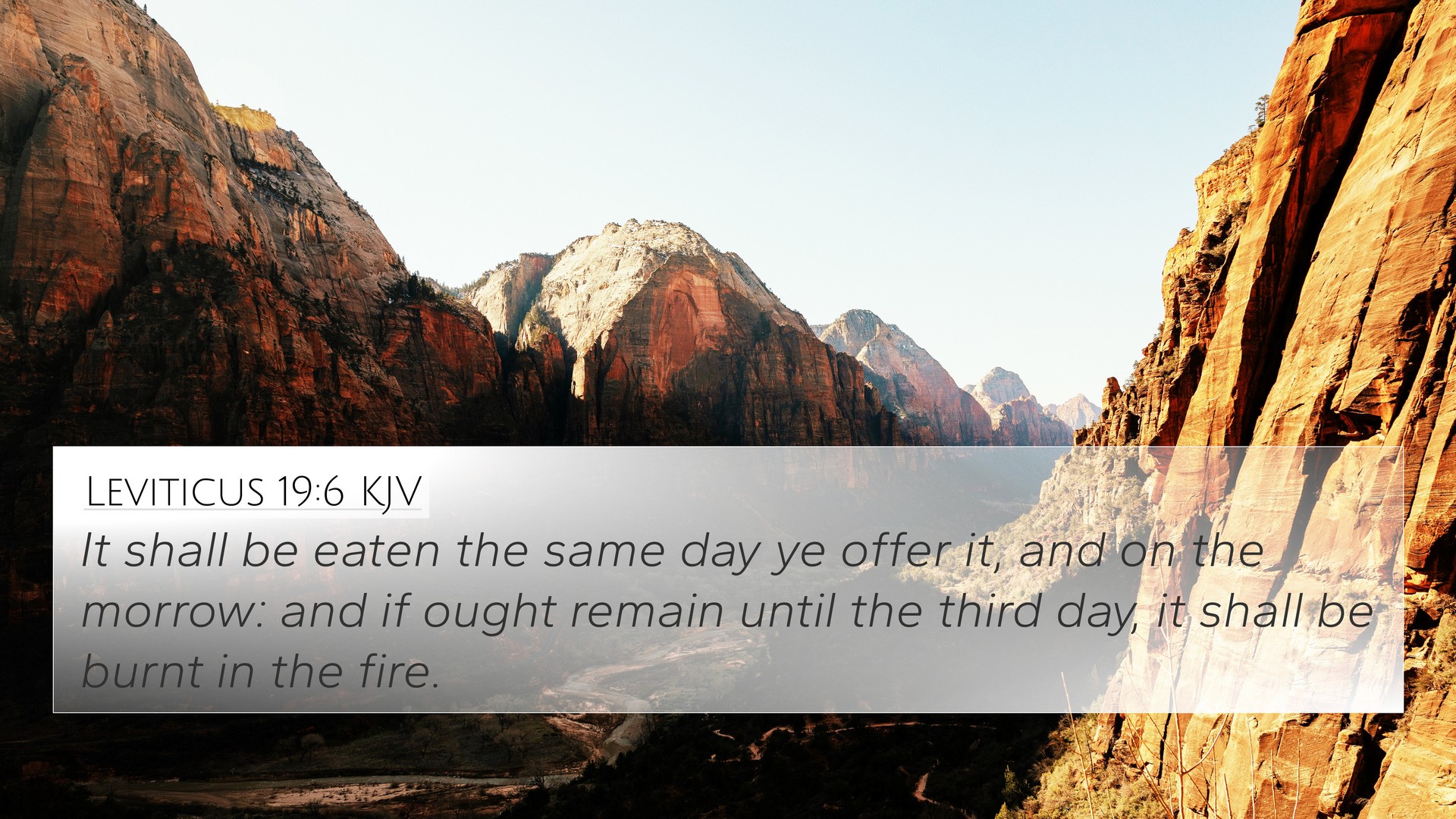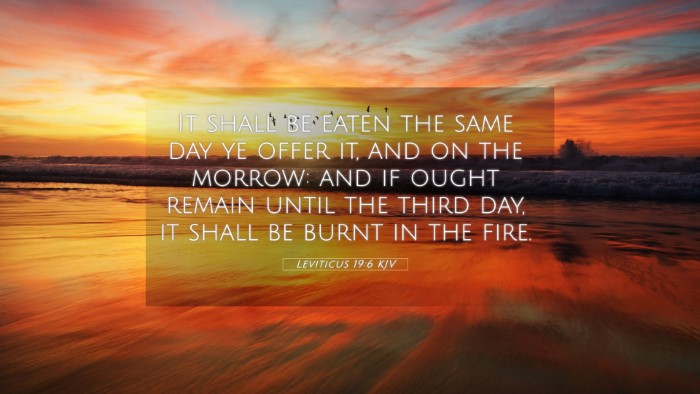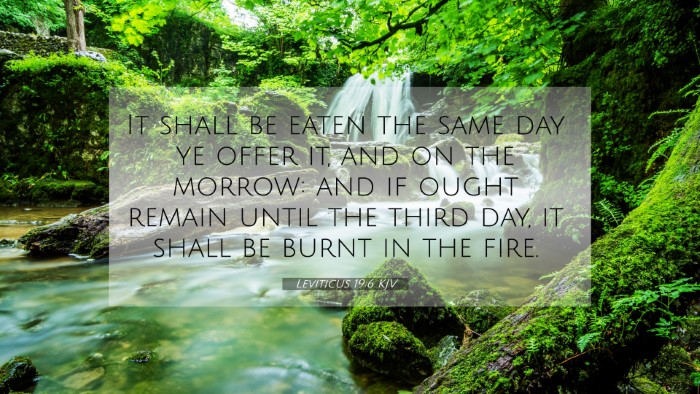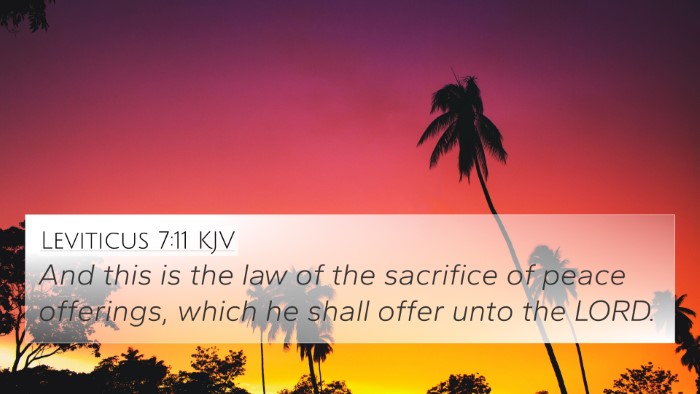Understanding Leviticus 19:6
Leviticus 19:6 states: "And ye shall eat it the same day ye offer it, and on the morrow: and if ought remain until the third day, it shall be burnt in the fire." This verse addresses specific guidelines regarding sacrificial offerings in the context of ancient Israelite worship practices.
Summary of Insights from Public Domain Commentaries
Matthew Henry's Commentary
Matthew Henry emphasizes the importance of obedience to divine instructions, highlighting that consuming the sacrificial offerings on the same day speaks to a sense of urgency and reverence for God’s provisions. He states that the offerings should be treated with sanctity, ensuring that what is dedicated to God is not mishandled or left unchecked.
Albert Barnes' Notes on the Bible
Albert Barnes offers a detailed interpretation that focuses on the ritual cleanliness and proper conduct expected from the Israelites. The specified time for consumption illustrates a boundary set to prevent decay and shows a commitment to maintaining holiness before the Lord. He also mentions the ritual significance of consuming the offering, associating it with communal worship and fellowship with God.
Adam Clarke's Commentary
Adam Clarke provides further insight into the regulations surrounding offerings, emphasizing the importance of proper timing and the avoidance of waste. He notes that the ordination for burning the leftover sacrifices on the third day prevents any unholy practices from developing. Clarke also relates this practice to the overarching theme of purity and devotion in worship.
Key Themes and Connections
This passage is part of a broader set of laws concerned with holiness and right conduct. It signals the importance of honoring God through intentional actions, clean offerings, and the right timing for consumption, reflecting themes of purity, sacrifice, and community in worship.
Related Bible Cross-References
- Exodus 12:10: Instructions on the eating of the Passover lamb aligns with timely consumption.
- Leviticus 7:15: Discusses the importance of consuming the peace offerings on the same day.
- Deuteronomy 12:17-18: Outlines prohibitions against consuming offerings outside the prescribed guidelines.
- 1 Corinthians 10:21: Paul speaks about communion with God, paralleling sacrifice with the offerings made by the Israelites.
- Psalms 50:13-15: God’s emphasis on the proper way to approach offerings and sacrifices.
- Hebrews 13:10: Discusses the spiritual sacrifice and the importance of consuming the spiritual truths found in Christ.
- John 6:53-58: Jesus expands on the symbolism of eating and drinking, establishing a connection between physical offerings and spiritual sustenance.
- Romans 12:1: The call for believers to offer their lives as living sacrifices, drawing a parallel to the spirit of the Old Testament offerings.
- James 1:27: A reminder that pure worship aligns with God’s standards, which can be understood through the regulations of offerings.
- Matthew 5:23-24: Encourages proper conduct in offering to God, which can be linked to the principles in Leviticus.
Thematic Connections
The themes of Leviticus 19:6 can be explored through various connections between Bible verses. Here are some significant themes to consider when examining this verse:
- Obedience to God: Highlighted in both the Old and New Testaments as essential for worship.
- Holiness in Worship: The necessity of maintaining purity in offerings, as emphasized in multiple scriptures.
- Proper Conduct: Guidelines for approaching God with the right attitude and actions, reflected through cross-references.
- Spiritual Sacrifices: The transition from physical offerings to the deeper spiritual understanding in Christ.
- Community and Fellowship: The importance of shared worship and remembering God’s provisions as a community.
Applying Cross-Reference Tools
To fully interpret Leviticus 19:6, utilizing cross-reference tools can be invaluable. Here are methods and resources for studying:
- Bible Concordance: A tool for locating verses and analyzing their themes.
- Cross-reference Bible Study: An approach that involves systematically checking related verses to gain insight.
- Bible Reference Resources: Utilizing study Bibles with integrated cross-reference guides.
- Comprehensive Bible Cross-Reference Materials: Books and online tools designed to enhance contextual understanding.
Conclusion
Leviticus 19:6 serves as a significant verse within the tapestry of biblical laws outlining the vital connection between obedience, holiness, and worship. By examining this verse through public domain commentaries and utilizing cross-referencing techniques, we deepen our understanding of God’s expectations from His people and the enduring principles that connect the Old and New Testaments. Exploring these connections enriches our faith and provides a pathway for deeper spiritual insight.



